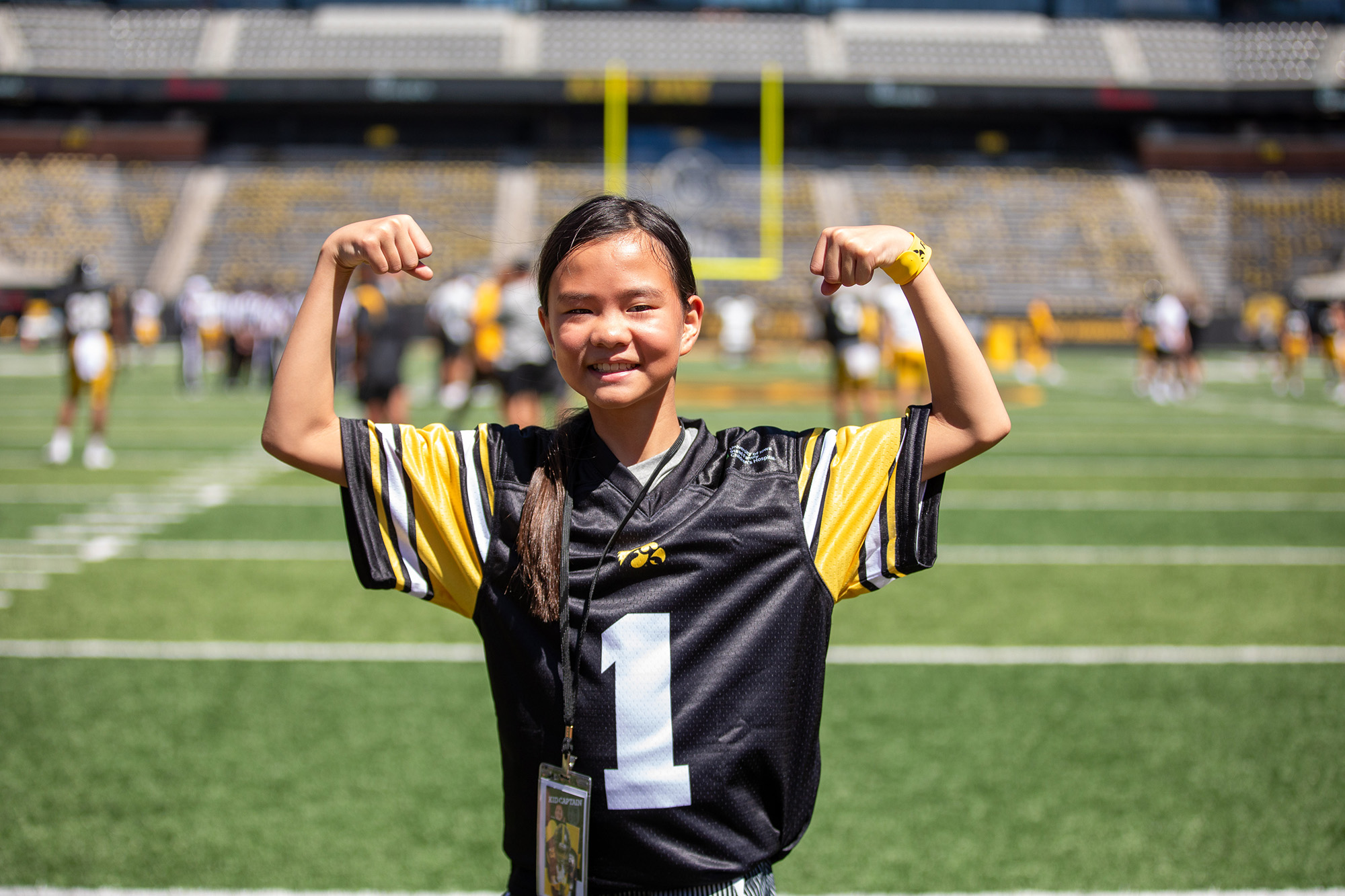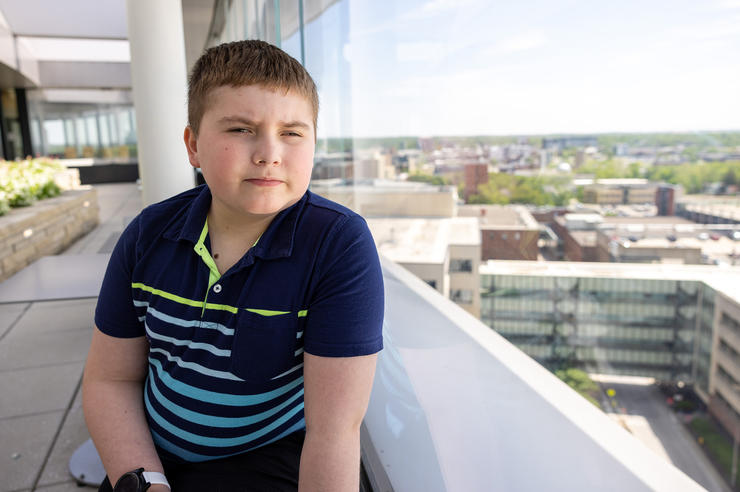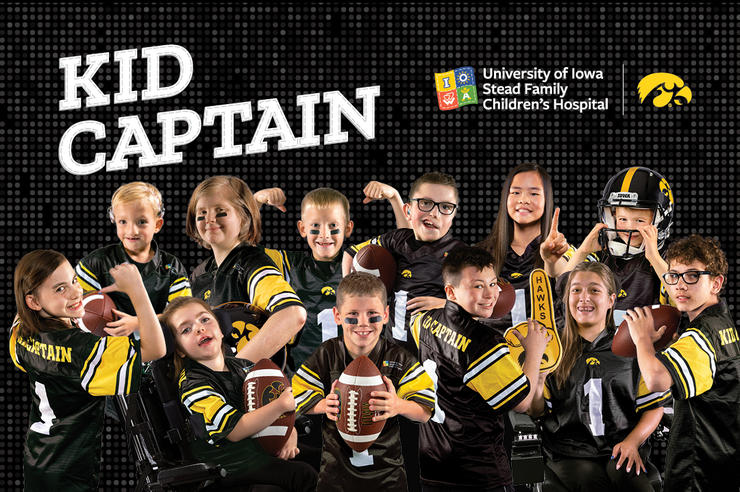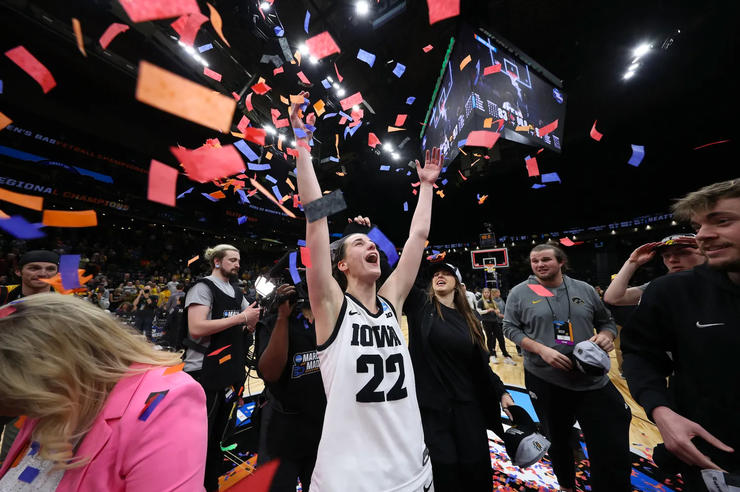Meet Kid Captain Chloe Dinkla

The girl who would come to be known as Chloe Dinkla spent her infancy in an overcrowded orphanage in northern China. Her adoptive parents, Megan and Alex Dinkla of Winterset, Iowa, knew that Chloe had clubfoot, and that despite being nearly 2, she could not sit on her own, let alone crawl or walk.
“She had only been given a bottle for food, and the most heartbreaking part of it all: she didn’t know how to love and be loved,” Megan remembers.
Once Chloe arrived in the United States and was examined at University of Iowa Stead Family Children’s Hospital, she was diagnosed with several serious conditions:
- Scoliosis, a curvature of the spine.
- Spina bifida, a birth defect in where there is incomplete closing of the spine.
- Tethered spinal cord, where the spinal cord abnormally attaches to the wall of the spinal
- cord.
- A bony mass that split her spinal cord.
“She had less muscle tone than what a newborn infant typically would,” Alex says.

University of Iowa Stead Family Children’s Hospital is Iowa’s only nationally ranked children’s hospital, offering all pediatric subspecialties and caring for kids from all 99 counties in Iowa. We provide world-class pediatric care that families trust—and kids deserve.
Giving Chloe a chance
The family’s next referral was to Stuart Weinstein, MD, an orthopedic surgeon at UI Hospitals & Clinics.
“He did an X-ray and spoke the words we will never forget: ‘She has scoliosis, but there is something else not right about her back in this X-ray. We need to figure out what it is,’” Megan says.
That started a chain of events leading to the discovery of a mass on her spine that essentially split her spinal cord in half. They were told that had she spent a few more months in the orphanage, Chloe would have been paralyzed.
“It shook us pretty hard,” Alex recalls. “But I looked right at Megan and said, ‘We’re going to give this girl a chance.’ We had 100% faith in the doctors.”
Doctors explained that a fatty mass tumor grew inside Chloe’s spine and a small bone spur tore part of her spinal cord in half, like a nail in a tree.
Putting Chloe at ease
Just days later, neurosurgeon Arnold Menezes, MD, performed an 11-hour surgery to remove the tumor and wrapped her spinal cord to reconnect it.
“We truly feel like Dr. Weinstein and Dr. Menezes saved her life,” Megan says. “These two doctors went above and beyond to help heal her. It is comforting to know that the two of them work so closely together.”
Dr. Menezes even brought ice cream for Chloe after the surgery, one of the personal caring gestures that have helped put Chloe at ease over time.
Megan recalls when her daughter was first brought to the hospital.
“She was just getting used to us. Seeing anyone else—especially doctors in a big hospital— scared her troubled heart,” Megan says. “The warmth and compassion that all of the people within the hospital showed us from the start will forever be one of the biggest blessings in our life. It’s no longer a scary place for her.”
Chloe started assisted walking when she was about 3, and was able to walk unassisted when she began preschool.
“The warmth and compassion that all of the people within the hospital showed us from the start will forever be one of the biggest blessings in our life.”
Overcoming challenges
Chloe has since had subsequent operations, including the placement of MAGnetic Expansion Control (MAGEC) rods, to minimize the progression of scoliosis. These implantable rods are magnetically lengthened every three months using an external remote control. Chloe will receive these adjustments at UI Stead Family Children’s Hospital until she finishes growing, when they will be replaced by permanent rods.
Chloe has also been treated for neurogenic bladder, a cause of bladder control issues; an eye muscle disorder; and Duane syndrome, a congenital eye misalignment that causes difficulties in the eyes moving from side to side.
University of Iowa Stead Family Children’s Hospital’s board-certified pediatric orthopaedists are trained to treat a range of congenital, developmental, and traumatic conditions affecting children’s bones, joints, and muscles. Our physicians are world-renowned experts in surgical and non-surgical treatments for conditions such as scoliosis, limb length discrepancies, clubfoot, hip dysplasia, and fractures.
Learn more about our orthopedics services.
University of Iowa Stead Family Children’s Hospital is home to one of the most experienced and comprehensive pediatric neurosurgery programs in the nation and the only nationally ranked program in Iowa.
“She’s overcome so much,” Megan says, adding that although certain activities are off-limits, such as jumping on the trampoline and playing in sports, “she wants to do everything.”
“The journey we’ve taken with Chloe has been nothing but just awesome,” Alex adds. “She is a little fighter.”
Now in fifth grade, 11-year-old Chloe loves crafts and painting.
Her parents say Chloe’s strength and determination to overcome so many odds has been inspiring to everyone around her, including her care team.
“They take the time to know her history and to know her,” Megan says. “They make us feel at peace and Chloe knows they care about her without a doubt, and we know that they care about her, too. It’s hard to express how grateful we are.”
“You know you’re in absolutely phenomenal hands,” Alex adds. “We don’t know what her future holds with her mobility, but we are certain that she will continue to get the best medical care at UI Stead Family Children’s Hospital.”



